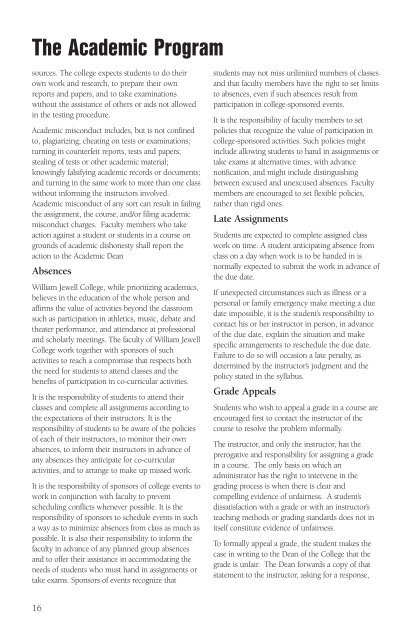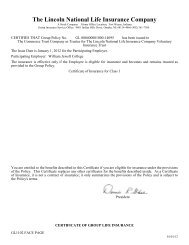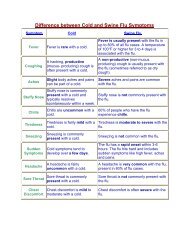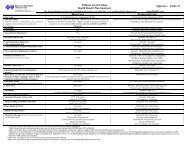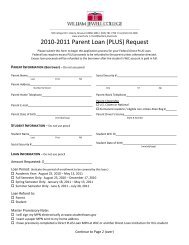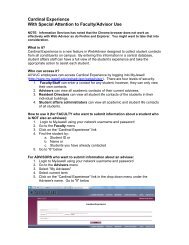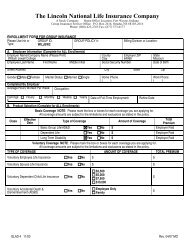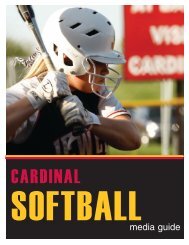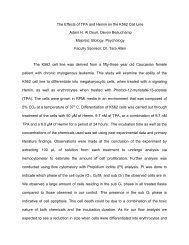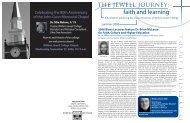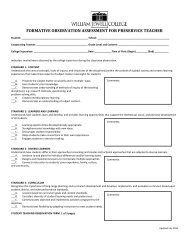Courses of Study - William Jewell College
Courses of Study - William Jewell College
Courses of Study - William Jewell College
You also want an ePaper? Increase the reach of your titles
YUMPU automatically turns print PDFs into web optimized ePapers that Google loves.
The Academic Program<br />
sources. The college expects students to do their<br />
own work and research, to prepare their own<br />
reports and papers, and to take examinations<br />
without the assistance <strong>of</strong> others or aids not allowed<br />
in the testing procedure.<br />
Academic misconduct includes, but is not confined<br />
to, plagiarizing; cheating on tests or examinations;<br />
turning in counterfeit reports, tests and papers;<br />
stealing <strong>of</strong> tests or other academic material;<br />
knowingly falsifying academic records or documents;<br />
and turning in the same work to more than one class<br />
without informing the instructors involved.<br />
Academic misconduct <strong>of</strong> any sort can result in failing<br />
the assignment, the course, and/or filing academic<br />
misconduct charges. Faculty members who take<br />
action against a student or students in a course on<br />
grounds <strong>of</strong> academic dishonesty shall report the<br />
action to the Academic Dean<br />
Absences<br />
<strong>William</strong> <strong>Jewell</strong> <strong>College</strong>, while prioritizing academics,<br />
believes in the education <strong>of</strong> the whole person and<br />
affirms the value <strong>of</strong> activities beyond the classroom<br />
such as participation in athletics, music, debate and<br />
theater performance, and attendance at pr<strong>of</strong>essional<br />
and scholarly meetings. The faculty <strong>of</strong> <strong>William</strong> <strong>Jewell</strong><br />
<strong>College</strong> work together with sponsors <strong>of</strong> such<br />
activities to reach a compromise that respects both<br />
the need for students to attend classes and the<br />
benefits <strong>of</strong> participation in co-curricular activities.<br />
It is the responsibility <strong>of</strong> students to attend their<br />
classes and complete all assignments according to<br />
the expectations <strong>of</strong> their instructors. It is the<br />
responsibility <strong>of</strong> students to be aware <strong>of</strong> the policies<br />
<strong>of</strong> each <strong>of</strong> their instructors, to monitor their own<br />
absences, to inform their instructors in advance <strong>of</strong><br />
any absences they anticipate for co-curricular<br />
activities, and to arrange to make up missed work.<br />
It is the responsibility <strong>of</strong> sponsors <strong>of</strong> college events to<br />
work in conjunction with faculty to prevent<br />
scheduling conflicts whenever possible. It is the<br />
responsibility <strong>of</strong> sponsors to schedule events in such<br />
a way as to minimize absences from class as much as<br />
possible. It is also their responsibility to inform the<br />
faculty in advance <strong>of</strong> any planned group absences<br />
and to <strong>of</strong>fer their assistance in accommodating the<br />
needs <strong>of</strong> students who must hand in assignments or<br />
take exams. Sponsors <strong>of</strong> events recognize that<br />
students may not miss unlimited numbers <strong>of</strong> classes<br />
and that faculty members have the right to set limits<br />
to absences, even if such absences result from<br />
participation in college-sponsored events.<br />
It is the responsibility <strong>of</strong> faculty members to set<br />
policies that recognize the value <strong>of</strong> participation in<br />
college-sponsored activities. Such policies might<br />
include allowing students to hand in assignments or<br />
take exams at alternative times, with advance<br />
notification, and might include distinguishing<br />
between excused and unexcused absences. Faculty<br />
members are encouraged to set flexible policies,<br />
rather than rigid ones.<br />
Late Assignments<br />
Students are expected to complete assigned class<br />
work on time. A student anticipating absence from<br />
class on a day when work is to be handed in is<br />
normally expected to submit the work in advance <strong>of</strong><br />
the due date.<br />
If unexpected circumstances such as illness or a<br />
personal or family emergency make meeting a due<br />
date impossible, it is the student’s responsibility to<br />
contact his or her instructor in person, in advance<br />
<strong>of</strong> the due date, explain the situation and make<br />
specific arrangements to reschedule the due date.<br />
Failure to do so will occasion a late penalty, as<br />
determined by the instructor’s judgment and the<br />
policy stated in the syllabus.<br />
Grade Appeals<br />
Students who wish to appeal a grade in a course are<br />
encouraged first to contact the instructor <strong>of</strong> the<br />
course to resolve the problem informally.<br />
The instructor, and only the instructor, has the<br />
prerogative and responsibility for assigning a grade<br />
in a course. The only basis on which an<br />
administrator has the right to intervene in the<br />
grading process is when there is clear and<br />
compelling evidence <strong>of</strong> unfairness. A student’s<br />
dissatisfaction with a grade or with an instructor’s<br />
teaching methods or grading standards does not in<br />
itself constitute evidence <strong>of</strong> unfairness.<br />
To formally appeal a grade, the student makes the<br />
case in writing to the Dean <strong>of</strong> the <strong>College</strong> that the<br />
grade is unfair. The Dean forwards a copy <strong>of</strong> that<br />
statement to the instructor, asking for a response,<br />
16


